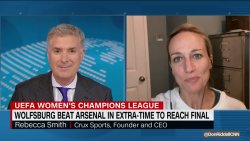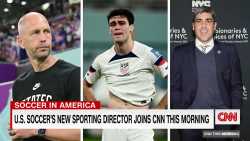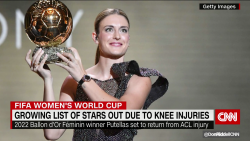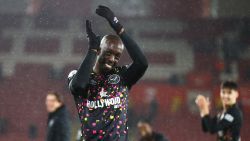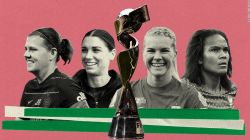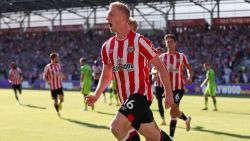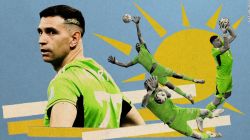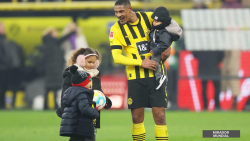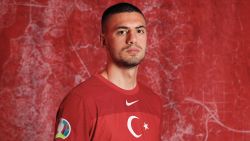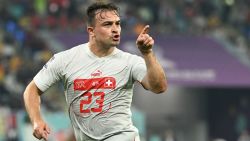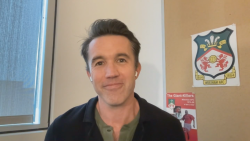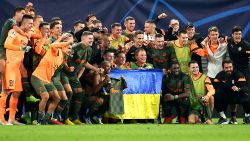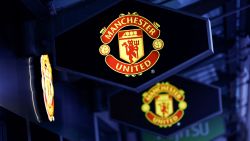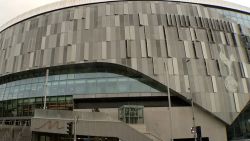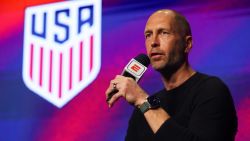With an hour gone and a sorry Arsenal trailing 3-0 to Manchester City Sunday, Mesut Ozil was substituted. He trudged from the pitch and as he approached the Arsenal bench petulantly kicked his gloves into the air.
These are tough times for Ozil. He has become a lightning rod for Arsenal fans’ dissatisfaction over the last few seasons as the club has slipped down the Premier League pecking order. Despite his undoubted creative talent, Ozil’s languid playing style has led to criticism he lacks the fight to help his team.
Sunday’s substitution capped a torrid few days for Ozil, who has found himself at the center of a sporting and geopolitical row after a controversial tweet in which he took aim at China for its dealings with China’s Muslim Uyghur minority in the northwest Xinjiang province.
China is taking more and more of an interest in the world’s game and it hasn’t taken kindly to Ozil’s social media intervention.
“Just because he’s a well-known sportsman, it doesn’t give him the right to comment on issues relating to the national interests and he needs to explain himself,” was the verdict from online sports platform Sina Sports which released a post on Sina Weibo.
READ: Mesut Ozil ‘blinded by some fake news,’ says China
The US State Department has said that for the last two-and-a-half years, China has detained up to two million Uyghurs in what some describe as internment camps.
Arsenal’s German international is a devout Muslim with Turkish roots, and is good friends with Turkish President Recep Tayyip Erdogan. He is followed by more than 24 million on Twitter and reportedly Arsenal’s highest paid player with a salary of £350,000 ($468,000) per week.
The reaction to Ozil’s tweet poses the wider question of whether athletes should steer clear of politics, or whether it is their right – even responsibility – to speak out.
Football star Megan Rapinoe has long used her platform to campaign for equality, and recently urged Lionel Messi and Cristiano Ronaldo – two of football’s best ever players – to speak up on non-sporting matters.
Perhaps the most famous example of athletes speaking out is the Black Power salute of US athletes Tommie Smith and John Carlos at the 1968 Mexico Olympics. It is generally celebrated as a progressive moment although it cost them dearly at the time. Colin Kaepernick’s bended knee protest has also come at a price. He hasn’t played in the NFL since 2016.
READ: From the Black Power salute to Colin Kaepernick: What’s changed?
‘Apolitical as an organization’
Amnesty International said Ozil shouldn’t be punished by Arsenal.
“In the past few years China has gone to incredible lengths to suppress information related to its unprecedented persecution of Muslims in Xinjiang,” Amnesty International’s business and human rights analyst William Nee told CNN. “Arsenal does not need to endorse Ozil’s comments, but it must be aware that it is at risk of being a tool of Chinese censorship if it subsequently punishes him for his views.”
The reaction to Ozil’s social media posts was swift from Chinese state broadcaster CCTV, which pulled Arsenal’s marquee game Manchester City from its programming.
Arsenal released a statement over the weekend saying that it’s “always apolitical as an organization” and wanted to make clear “that these are Mesut’s personal views.” Yet the north London club didn’t wade in after Hector Bellerin’s bold political message last week on the day of the UK general election.
The fullback used the hashtag, “F**kBoris,” referring to British Prime Minister Boris Johnson, whose Conservative Party ended up winning the vote.
Arsenal has been outside the Premier League title reckoning for years, but with players making declarations on social media or its sealing eye-catching sponsorship deals – as it did with Rwanda last year – the club continues to attract headlines.
“Ozil is perfectly entitled to his own opinions and of course he should have the freedom to express them wherever he chooses,” Simon Chadwick, professor of sports enterprise at the University of Salford near Manchester in England, told CNN.

But Chadwick says it is more complex than that.
“He tweeted his messages about China via an account in which he specifically and primarily references his work at Arsenal,” said Chadwick. “For many employees in most organizations, it is obvious and is often made clear that social media posts should not be made in the name of one’s employing organization.
“Either Ozil was extremely remiss in making his comments in this way or else Arsenal hasn’t effectively communicated with an employee regarding social media use.
“As for Arsenal’s response, it seems to betray an absence of policy and strategy within the organization. The club should have been telling players not to make controversial political statements on social media, or else instruct them to do so from accounts that do not mention and are not associated with the club.
“Because they haven’t been doing this, we now have a situation where the club is distancing itself from Ozil but not from Bellerin.”
Asked to comment Monday on Chadwick’s thoughts, Arsenal reverted to its earlier statement.
‘Hugely sensitive’ and ‘very complicated’
Chinese business is becoming a big player in world football. English Premier League side Wolves is owned by Chinese conglomerate Fosun and Southampton is owned by Chinese businessman Gao Jisheng.
“Arsenal is not alone in being somewhat clumsy in responding to such problems,” added Chadwick. “Many European football clubs do not understand China at all well, hence they are prone to making gaffs.
“China is a hugely sensitive and often very complicated environment in which to do business. Many clubs are happy to take the money on offer in China but frequently fail to understand the context within which they do this.”
The Chinese government has become involved in the Ozil saga, inviting the 31-year-old to visit Xinjiang province to “distinguish right from wrong.” He was “blinded by some fake news and influenced by some false words,” according to a spokesman from the Chinese Foreign Ministry.
“He doesn’t know that the Chinese government protects Chinese citizens, including the Uyghur ethnic people’s freedom of religious belief, in accordance with the law,” spokesman Geng Shuang said in a daily press briefing Monday.
It is the second time in a matter of months sports has collided with politics in China.
CCTV didn’t air, as first planned, pre-season NBA games in October after Houston Rockets’ general manager Daryl Morey’s now deleted tweet in support of the pro-democracy protests in Hong Kong. NBA commissioner Adam Silver backed Morey’s freedom of expression, which escalated matters.
In Manchester City’s pre-season tour of China in July as part of the Asia Trophy, the defending Premier League champion was criticized by Chinese media for not interacting more with local fans and media. It went with a “desire to win wallets, not hearts and minds,” according to an editorial on the English language website of China’s state-run press agency Xinhua.
“After some issues during Manchester City’s tour to China this summer and the recent NBA controversy, it was only a matter of time before a Premier League player, club or the league itself became embroiled in such a problem,” said Chadwick. “And this isn’t just happening in sport, it is a regular issue for westerners across a range of industrial sectors.”
Visit our football page for more news and videos
The Premier League refused to comment.
Additional reporting by John Sinnott, Aleks Klosok, Lily Lee.


